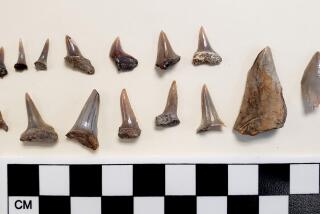Thriving International Market : Theft of Fossils Is a Growing Problem in U. S.
- Share via
SALT LAKE CITY — In a remote canyon in the American West, where a dinosaur stepped in mud tens of millions of years ago, a man pries up the fossil footprint and loads it in his four-wheel-drive pickup. Weeks later, in Japan, a wealthy collector pays $3,000 for it.
That scenario, state and federal officials say, has occurred with increasing frequency in the last decade as large or rare fossils become chic collectors’ items, not just museum pieces.
There is general alarm that public lands are being stripped, not by simple souvenir hunters but by commercial collectors feeding a world market, depriving the public of a valuable cultural resource and paleontologists of scientific data.
“We have a lot of people just bootlegging it and taking commercial quantities,” said Bob Randolph, a geologist with the Bureau of Land Management in Utah. “They’ll take it by the tons if they can get it.
“You can see areas where there were (petrified) logs and trees and things like that, and now there’s just scraps on the ground. And it’s the same with the dinosaur bones.”
Utah Fossils Removed
In the geologic formation known as Wheeler Amphitheater in Utah’s west desert, collectors have hauled away trilobites, animals that looked like horseshoe crabs, he said. Near Moab, in eastern Utah, huge fossilized bones have been pillaged.
The same thievery is occurring in several states.
“There are fossil fish in Wyoming that are collected and sold for hundreds of dollars, if not thousands of dollars,” Randolph said. “It’s a million-dollar business,” he said.
Dave Gillette, curator of paleontology at the New Mexico Museum of Natural History in Albuquerque, said his state also has seen a rise in collectors illegally stripping public lands of specimens.
“I think it’s a universal problem,” Gillette said. “The real problem with us is too much of the public land in the West is where the fossil sites are located and that public land has easy access. Laws are awfully difficult to enforce.”
Cites International Demand
In Wyoming, Jason Lillegraven of the University of Wyoming said the crime is keeping pace with international demand.
“There is very much a growing market for vertebrate fossils, fossils in general, that go literally on the international market,” he said. “A lot of magnificent Wyoming fossils end up in Switzerland (and) all across Europe.”
Dan Chure, paleontologist at Dinosaur National Monument in Utah and Colorado, said there is a legal market for fossils and that catalogues from dealers list prices of up to $20,000 for rare finds. But, he said, with the quantity of fossils available on the international market, many had to come from illegal collecting on public lands.
The problem of the stripping of fossils and petrified wood from public lands parallels recent, more publicized, concerns over the massive theft of archeological treasures from sites where ancient Indians once lived. Both reflect a growing market for ancient artifacts.
Formation of Fossils
Fossils are generally formed when animals or plants die and are buried in sediment before they can decompose. Their skeletal structures are gradually replaced by minerals in the same form as when the animals lived.
Now millions of years later, the demand for those fossils by private collectors is rapidly growing, especially in Japan and Europe.
“The demand for fossils is increasing each year, and they’re becoming more and more valuable,” said Jim Madsen, state paleontologist for Utah. “Dinosaur bones, for example, are getting very valuable.”
Randolph said high prices have brought many people, especially those in financially depressed areas, into the field to collect bones and wood. “These people are starting to get hungry, and they’re looking for some money,” he said.
But officials said the growing market is taking its toll.
Plunderers Complain
“Even the plunderers are complaining there’s nothing else to pick up,” Madsen said. “The people with tons of petrified wood in their backyard say, ‘Hell, you can’t get any good wood anymore.’ The same with dinosaur bones. There’s no good red dinosaur bones any more.”
Collecting laws vary from state to state and rules from federal agency to agency, depending on which has control over the land. There is general recognition that new regulations are needed, but paleontologist Gillette said professionals in his field also do not want to discourage amateurs.
“It’s important to recognize amateurs (paleontologists) have historically played a very important role in scientific discoveries,” Gillette said. “That role should not be minimized in the face of these debates over whether amateurs should be allowed to collect.”
A National Academy of Science committee studying the problem is expected to issue recommendations on new rules sometime this year.
More to Read
Sign up for Essential California
The most important California stories and recommendations in your inbox every morning.
You may occasionally receive promotional content from the Los Angeles Times.













